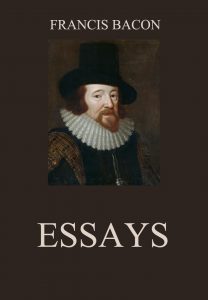Essays – Sir Francis Bacon
Of Bacon’s literary, as distinct from his philosophical and professional, works, far the most popular and important are the ‘Essays.’ But it may not be superfluous to remark that the ‘Essays’ are the most original of all Bacon’s works, those which, in detail, he seems to have thought out most completely for himself, apart from books and collections of commonplaces. Though the ‘Essays’ have the same title as the larger collection of Montaigne, the two works have little in common, except their rare power of exciting interest and the unmistakable mark of genius which is impressed on them both.
Format: Paperback
Essays.
ISBN: 9783849692094
Available at amazon.com and other venues.
Biography of Francis Bacon (from Wikipedia):
Francis Bacon, 1st Viscount St Alban, PC KC (22 January 1561 – 9 April 1626) was an English philosopher, statesman, scientist, jurist, orator, and author. He served both as Attorney General and as Lord Chancellor of England. After his death, he remained extremely influential through his works, especially as philosophical advocate and practitioner of the scientific method during the scientific revolution.
Bacon has been called the father of empiricism. His works argued for the possibility of scientific knowledge based only upon inductive reasoning and careful observation of events in nature. Most importantly, he argued this could be achieved by use of a sceptical and methodical approach whereby scientists aim to avoid misleading themselves. While his own practical ideas about such a method, the Baconian method, did not have a long lasting influence, the general idea of the importance and possibility of a sceptical methodology makes Bacon the father of scientific method. This marked a new turn in the rhetorical and theoretical framework for science, the practical details of which are still central in debates about science and methodology today.
Bacon was generally neglected at court by Queen Elizabeth, but after the accession of King James I in 1603, Bacon was knighted. He was later created Baron Verulam in 1618 and Viscount St. Alban in 1621. Because he had no heirs, both titles became extinct upon his death in 1626, at 65 years of age. Bacon died of pneumonia, with one account by John Aubrey stating that he had contracted the condition while studying the effects of freezing on the preservation of meat. He is buried at St Michael’s Church, St Albans, Hertfordshire.
(The text of the last section was taken from a Wikipedia entry and is available under the Creative Commons Attribution-ShareAlike License.)
Publisher’s Note: This book is printed and distributed by Createspace a DBA of On-Demand Publishing LLC and is typically not available anywhere else than in stores owned and operated by Amazon or Createspace.

